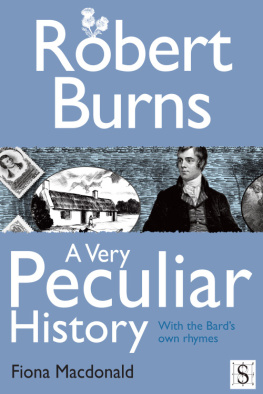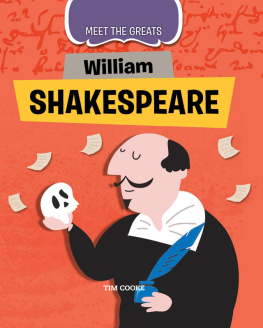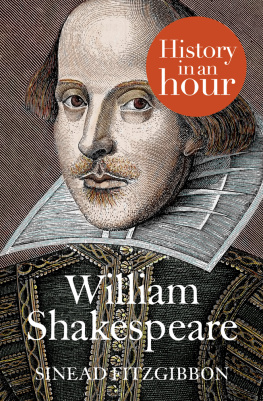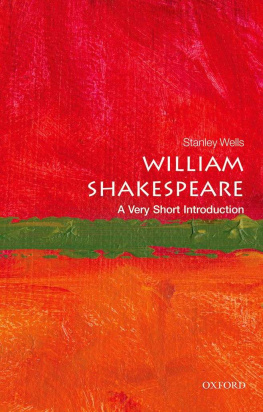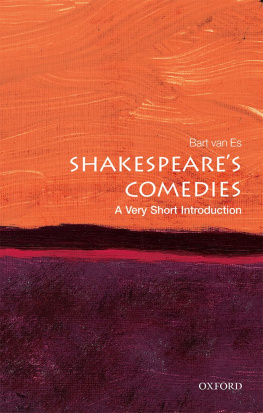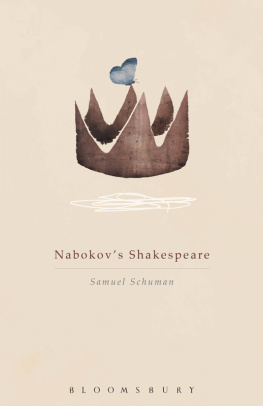Title Page
WILLIAM SHAKESPEARE, A VERY PECULIAR HISTORY
With added soliloquies
Written by
Jacqueline Morley
Created and designed by David Salariya
Publisher Information
First published in Great Britain in MMXII by Book House, an imprint of
The Salariya Book Company Ltd
25 Marlborough Place, Brighton BN1 1UB
www.salariya.com
www.book-house.co.uk
Digital edition converted and distributed in 2012 by
Andrews UK Limited
www.andrewsuk.com
Editor: Jamie Pitman
Assistant editor: Jodie Leyman
The Salariya Book Company Ltd MMXII
All rights reserved. No part of this publication may be reproduced, stored in or introduced into a retrieval system or transmitted in any form, or by any means (electronic, mechanical, photocopying, recording or otherwise) without the written permission of the publisher. Any person who does any unauthorised act in relation to this publication may be liable to criminal prosecution and civil claims for damages.
Every effort has been made to trace copyright holders. The Salariya Book Company apologises for any omissions and would be pleased, in such cases, to add an acknowledgement in future editions.
Visit our website at
www.book-house.co.uk
or go to
www.salariya.com
for free electronic versions of:
You Wouldnt Want to be an Egyptian Mummy!
You Wouldnt Want to be a Roman Gladiator!
You Wouldnt Want to Join Shackletons Polar Expedition!
You Wouldnt Want to Sail on a 19th-Century Whaling Ship!
Dedication
This book is for Teddy
JM
Quotes

Shakespeare never had six lines together without a fault. Perhaps you may find seven, but this does not refute my general assertion.
Dr Samuel Johnson, writer and lexicographer, 17091784
I know not such a power of vision, such a faculty of thought,in any other man. Such a calmness of depth; placid joyous strength; all things imaged in that great soul of his so true and clear, as in a tranquil unfathomable sea!
Thomas Carlyle, historian, 17951881
I have tried lately to read Shakespeare and found it so dull that it nauseated me.
Charles Darwin, naturalist, 18091882

Introduction: Who was Shakespeare, anyway?
Shakespeare what do you think of when you hear that name? Perhaps it brings back some great nights at the theatre, but, just as likely, it could make you think of a lacklustre school outing to a matine, where enjoyment was compulsory and often subject to some class discussion later.
Shakespeare, for most people, is something that is done at school. But behind the name there is a real person, and, believe it or not, he wasnt always a balding man in a ruff. He was Mr and Mrs Shakespeares boy, Will, who grew up to make quite a name for himself. How did he do it? Where did he work? Why did he write, and how? Was he a nice person? What sort of friends did he have? This book doesnt promise neat answers to all those questions thats often just not possible, as youll see but its going to have a go at answering some of them. It will try to take a look at Shakespeares work from Shakespeares point of view.
Perhaps wed better come clean here. Clear-cut facts, like where Shakespeare was on any particular day of the year, are certainly thin on the ground not non-existent, but thin. Yet, even though theyve been raked through so many times, by countless critics and historians, still theres no final agreement on exactly how much he wrote, when he wrote it, and what he did with his spare time.
But at the very least, we can dispose of some of the myths that have attached themselves to Shakespeares name

Shakespeare myth no. 1
So little is known about Shakespeares life that you could write it down on one side of a postcard.
Youd need a quite extraordinarily big postcard, actually. There is more factual evidence about the life of Shakespeare than there is for any other Elizabethan dramatist. There are baptismal records, death and burial records, documents relating to the buying and selling of goods and properties, known performance dates for many of his works, and publication dates for poems and plays.
Many documents relating to the Shakespeare family, including letters written to William himself, can be seen at the Shakespeare Centre Library & Archive at Stratford upon Avon.
Speak of me as I am; nothing extenuate,
Nor set down ought in malice.
Othello, Act V scene 2

CHAPTER ONE: Stratford days
In 26 April 1564 the vicar of Holy Trinity Church, Stratford upon Avon, in the county of Warwickshire, recorded a baptism in his parish register: William, son of John Shakespeare. (He actually wrote it in Latin: Gulielmus filius Johannes Shakspere though strictly speaking he ought to have written Johannis .) Will was the third of what were to be eight children, whose parents lived in a large house on Henley Street where, 12 years earlier, John had been fined for not removing an illegal rubbish tip from in front of his door.
John Shakespeare came from a family of local farmers, but a nose for business had prompted him to move from countryside to town, where he trained as a glover and soft-leather worker. He had obviously done well to be able to afford a substantial house in town.

Shakespeare myth no. 2
How fitting it is that Englands greatest poet was born and died on 23 April St Georges Day, dedicated to Englands patron saint.
Dont count on it though he certainly died on 23 April. We know he was christened on the 26th, but we dont know his birthday. Babies were baptised as soon as possible, usually within five days, because it was believed that they came into the world in a state of original sin and were doomed to limbo if they died before baptism. This traditional Catholic belief was still strong despite Englands official Protestantism Henry VIIIs break with Rome had come only 30 years earlier.
The five-day period gives William a birth date some time after 21 April. St Georges Day was picked long after his death for patriotic reasons.

A worthy townsman
Stratford in 1564 was a small, prosperous market town of around 2,000 inhabitants. Its bridge over the Avon carried the route south to London, a three-day journey away.
John Shakespeare soon made his mark in the town as an entrepreneur. As well as dressing leather and selling gloves, he was a dealer in wool and farm produce. In fact he became quite a big splash in a not-so-small puddle. In 1558 he was sworn in as town constable, six years later he was made a burgess (a member of the town council), and in 1567 an alderman. He was twice elected town chamberlain, the official responsible for keeping the civic records and accounts, and then, in 1569, the final honour he was chosen to be bailiff of Stratford (the equivalent of mayor).
Next page
